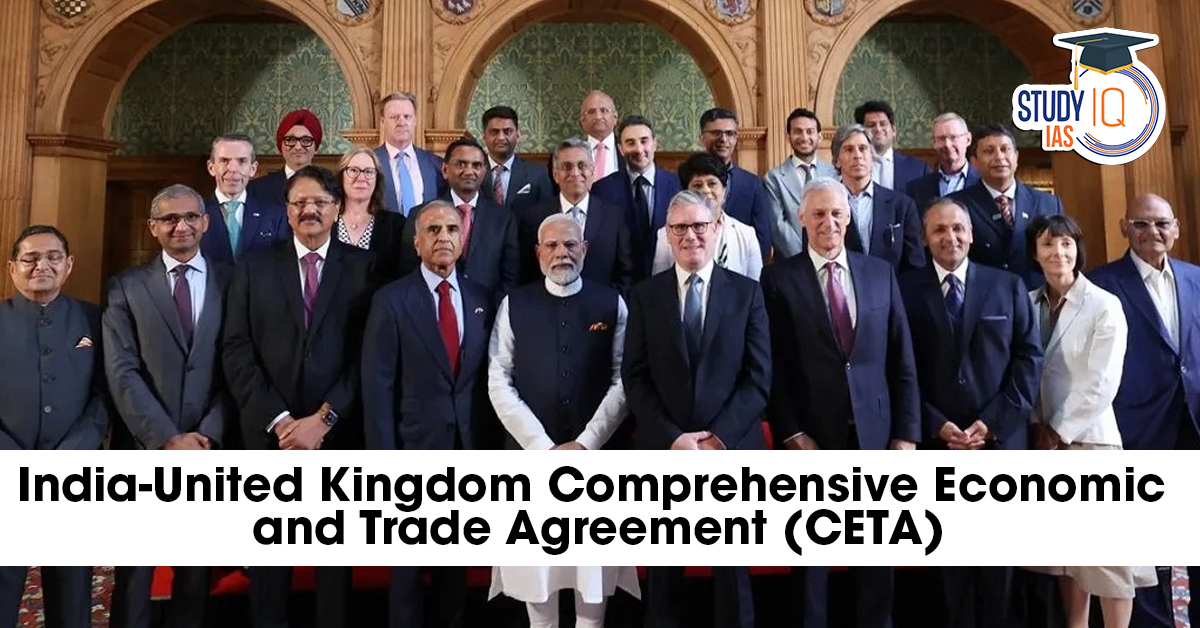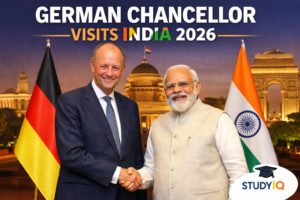Table of Contents
Context: The India-United Kingdom Comprehensive Economic and Trade Agreement (CETA) raises several questions regarding India’s commitments in the CETA’s intellectual property chapter (Chapter 13), particularly Article 13.6.
India UK Free Trade Agreement 2025
The India-UK Free Trade Agreement (FTA) was signed on 24 July 2025, after a crucial point in bilateral economic cooperation between the two countries. The agreement, whose official name is the Comprehensive Economic and Trade Agreement (CETA), was announced following the successful resolution of negotiations in May 2025.
Concerns related to India’s commitments under Chapter 13 (Intellectual Property) of CETA
Article 13.6 of CETA
“The Parties recognise the preferable and optimal route to promote and ensure access to medicines is through voluntary mechanisms, such as voluntary licensing…”
Why It’s Problematic
This provision:
- Promotes voluntary licensing (VL) as the “preferred” route.
- Sidelines compulsory licensing (CL) — a legal TRIPS-compliant measure India has historically used to ensure affordable medicine access.
What is Voluntary Licensing?
- Voluntary licensing is when the patent holder (usually a pharmaceutical company) voluntarily allows another company to manufacture and sell a patented product (usually a medicine), on mutually agreed terms. These licenses may include:
- Conditions on price, supply, or territories
- Technology transfer (optional and often limited)
- Restrictions on sublicensing or sourcing ingredients
- Example: Cipla produced remdesivir during COVID-19 under a voluntary licence from Gilead Sciences.
What is Compulsory Licensing?
- Compulsory licensing is when a government allows a company to produce a patented product without the consent of the patent holder, under specific public interest conditions.
- Under the Indian Patent Act (TRIPS-compliant), a compulsory licence can be granted if:
- The patented product is not available at a reasonable price
- The public’s reasonable requirements are not met
- The patent is not “worked” (i.e., commercially used) in India
- Example: In 2012, Natco Pharma got a compulsory licence to produce Bayer’s cancer drug sorafenib, bringing the monthly cost down from ₹2.8 lakh to under ₹9,000.
Concerns with Article 13.6 of CETA
- Position on Compulsory Licensing (CL): India was a strong proponent of CL at the WTO, backed by the Doha Declaration on TRIPS and Public Health (2001).
- CL allows governments to bypass patent restrictions to produce affordable medicines in the public interest (e.g., Natco Pharma’s CL for sorafenib in 2012 resulted in a 97% reduction in cancer drug prices).
- CETA’s wording implicitly delegitimises CL, pushing India away from its original stance.
- Demand for Technology Transfer on Favourable Terms: India has long demanded equitable technology transfer (since the New International Economic Order (NIEO) in 1974) for industrialisation & climate action (e.g., carbon-neutral technologies).
- CETA promotes tech transfer only under “mutually agreed terms”, which typically favour patent-holders.
- This weakens India’s negotiation leverage in climate forums and multilateral trade talks.
- Reinforces Earlier Concessions: India already weakened the “working” requirement in the EFTA FTA by allowing patent working declarations every 3 years (instead of annually). CETA reinforces this dilution.
Strategic Implications
Domestic
- Threatens public health access, especially for life-saving medicines.
- Undermines Parliament’s original intention when aligning the Patents Act with TRIPS (after JPC review).
Global
- India risks losing its leadership role among developing nations on IP flexibility.
- Weakens its climate technology negotiation power in platforms like UNFCCC.
Conclusion
- India’s acceptance of Article 13.6 in CETA marks a significant strategic retreat:
- From its commitment to compulsory licensing as a public health safeguard.
- From its long-standing demand for fair technology access for development and climate goals.
- This shift may erode domestic policy autonomy and affect India’s global standing in future IP and climate negotiations.


 German Chancellor Visit to India in 2026...
German Chancellor Visit to India in 2026...
 Iran Nuclear Crisis and India’s Role f...
Iran Nuclear Crisis and India’s Role f...
 H1B Visa Program, Beneficiaries, Eligibi...
H1B Visa Program, Beneficiaries, Eligibi...

























